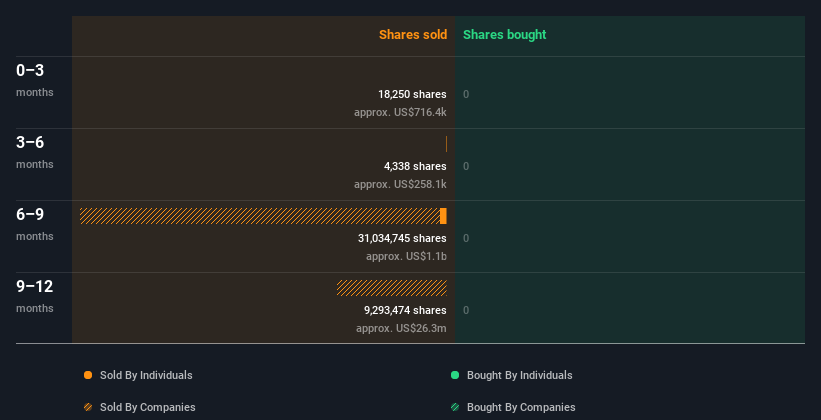AMC Entertainment (NYSE:AMC) and Gentrification on the Stock Market
This article first appeared on Simply Wall St News.
Although positively surprising in the latest earnings report, AMC Entertainment Holdings, Inc. (NYSE: AMC) failed to break to new highs, as the new Omicron variant unquestionably scared the investors.
Yet, the stock diverged from the broad market, which overcame the selloff while AMC continued to drift lower – pressured by insider selling.
Check out our latest analysis for AMC Entertainment Holdings
Gentrification on the Stock Market
One day, AMC will unquestionably find its way to the financial Hall of Fame. The uproar of the retail market that sent the stock thousands of percent higher showed that the times are changing. Institutions cannot discount the retail market strength or ability to execute coordinated pressure.
However, it is hard to get on the positive side of this business regardless of whether we observe the internal or external environment.
The company remains heavily indebted, with over US$11b in long-term liabilities. With the cash and its equivalents currently at US$1.6b, an improved cash burn from Q2 to Q3 is a rare positive, as it means that there is no need for new debt or dilution in the near future.
Yet, even with 100% theaters open, the revenue is 50% compared to Q3 19, and 2 years ago – even with double the attendance, the company still posted -US$0.53 earnings per share.
Furthermore, the external environment is clearly negative. The market shifted to entertainment at demand – with competitors like Disney, Netflix, ViacomCBS, or Discovery engaged in trench warfare for every subscriber.
The Insiders Aren't Believers
If we look at the data, insiders exclusively sold shares of AMC in recent months. Just days ago, CEO Adam Aron sold additional 312,500 shares, leaving him with less than 100,000 shares in direct beneficial ownership. Additionally, CFO Sean Goodman sold all of his remaining stake, 18,316 shares, leaving him with no direct ownership of the company.
While both executives have more equity grants down the road, as structured in their compensation packages, these decisions provide little support for the company's current valuation.
After the CEO, Mr.Aron, who just sold US$9.65m in shares, the biggest single sale by an insider was when the Senior VP & Chief Human Resources Officer, Carla Chavarria, sold US$2.5m worth of shares at US$62.67 per share.
In the last year, insiders in AMC Entertainment Holdings didn't buy any shares. If you want to know exactly who sold, for how much, and when, click on the graph below.
You can check out this free list of growing companies with considerable, recent, insider buying.
Insider Ownership
Usually, the higher the insider ownership, the more likely it is that insiders will be incentivized to build the company for the long term. AMC Entertainment Holdings insiders own about US$24m worth of shares. That equates to just 0.2% of the company.
Conclusion
Over the last 6 months, AMC shares lost around 50% of value, not in an aggressive sell-off but an orderly move downwards, with lower highs and lower lows.
While the price can stay disconnected from the fundamentals for a prolonged time, it cannot do it forever. Gentrifying the company by raising its value without improving the conditions in which it operates eventually becomes a game of chicken - until something (possibly even the external event) forces the reversion. Arguably, nobody should know more about the business other than CEO and CFO, and their persistent stock sale is telling us that they're not confident about the current valuation.
In addition to knowing about insider transactions going on, it's beneficial to identify the risks facing AMC Entertainment Holdings. Our analysis shows 5 warning signs for AMC Entertainment Holdings (2 are significant!) and we strongly recommend you look at them before investing.
Of course, you might find a fantastic investment by looking elsewhere. So take a peek at this free list of interesting companies.
For the purposes of this article, insiders are those individuals who report their transactions to the relevant regulatory body. We currently account for open market transactions and private dispositions, but not derivative transactions.
Have feedback on this article? Concerned about the content? Get in touch with us directly. Alternatively, email editorial-team@simplywallst.com
Simply Wall St analyst Stjepan Kalinic and Simply Wall St have no position in any of the companies mentioned. This article is general in nature. We provide commentary based on historical data and analyst forecasts only using an unbiased methodology and our articles are not intended to be financial advice. It does not constitute a recommendation to buy or sell any stock and does not take account of your objectives, or your financial situation. We aim to bring you long-term focused analysis driven by fundamental data. Note that our analysis may not factor in the latest price-sensitive company announcements or qualitative material.



